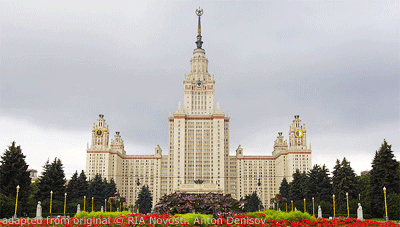Unhappy with one in a 100, Russia goes for 5

(Russia Beyond the Headlines – rbth.ru – Gleb Fedorov, RBTH – September 18, 2015)
Project 5-100, launched by presidential decree two years ago, sets the ambitious goal of getting five Russian universities in the world’s top 100 by 2020.
Since 2013, Russia has invested millions of dollars in an attempt to drive up the position of its universities in international rankings.
According to its official mandate, Project 5-100 is focused on increasing the competitiveness of Russian universities in the international marketplace. Fifteen universities were selected for the program, whose name comes from the overall goal of having five Russian universities in the top 100 of three world rankings: Times Higher Education World University Rankings, QS World University Rankings and Academic Ranking of World Universities.
Currently only two Russian universities appear in these rankings at all – Moscow State University and St. Petersburg State University – and only MSU in the top 100 of the ARWU. Moscow State University’s another good showing is 108th out of 700 schools in the 2015 QS World University Rankings.
According to Irina Abankina, director of the Institute of Education Development at the Higher School of Economics, with Project 5-100, the Ministry of Education and Science intends to separate out the Russian universities with the most potential, and give them the financing needed to help them achieve their goals. In 2015 the Project 5-100 universities will receive a total of 10.1 billion rubles ($148 million).
In interview with Times Higher Education, Alexander Polvalko, deputy minister of science and education, said that the program was not just about improving Russian university rankings, but making long-lasting changes in Russian higher education – which will in turn result in better rankings.
“This transformation has three key objectives,” Polvako said. “We want to change the university environment, upgrading it to a world-class level by creating a large choice of international educational programs. Second, we want to reform our university research – to join in partnership with leading international research teams and to increase our presence in highly cited international research journals. Third, we want to increase the attractiveness of our universities in order to recruit talented international faculty and students.”
Since the start of Project 5-100, Russian universities have indeed become more noticeable on the international education market, said editor-in-chief of Times Higher Education, Phil Baty, although he noted that the most noticeable school is Moscow State University, which is not part of Project 5-100.
“Moscow State University has been making impressive strides up the rankings recently. I predict it will see further good news when we publish the world university rankings for 2015-2016 on Oct. 1,” Baty said.
Abankina says that two universities that are in the program, Novosibirsk State University and the National Research Nuclear University, have also been moving up the rankings and are two schools to watch in the future.
Experts are skeptical about the program’s potential for success, however. Alex Usher, the president of Higher Education Associates in Canada, said that there are fundamental problems with Russia higher education that cannot be solved quickly.
“The management of universities which are very successful in rankings is much more ‘bottom-up,'” Usher wrote in a recent article for Higher Education in Russia and Beyond. “Russian universities, on the other hand, are very much ‘top-down’. University cultures change very slowly, so no one should expect Russian universities to suddenly become free-wheeling havens of progressive academic practice.”
According to Baty, the program will only be successful if it is a long-term commitment. “The biggest challenge is whether or not the reform and investment program goes far enough,” Baty said. The project is focused on the period up to 2020. What happens after that is anyone’s guess.
Baty does point out one aspect of Project 5-100 that might contribute to its long-term success.
“The most exciting aspect of the reform program is internationalization. Russia must work hard to attract and retain leading global talent from across the world. Too many great Russian scholars in the past left Russia to pursue their careers elsewhere. This must change. The reforms recognize this,” Baty said.
Article also appeared at rbth.co.uk/society/2015/09/18/unhappy_with_one_in_a_100_russia_goes_for_5_49283.html
